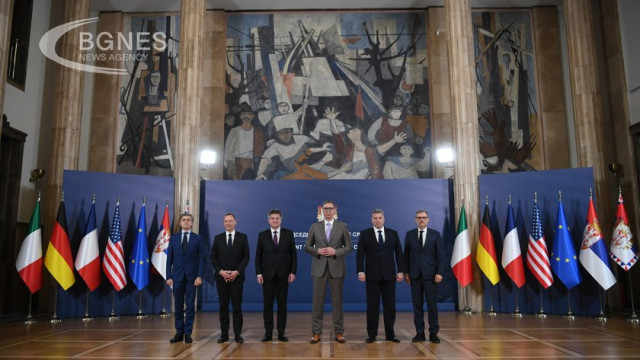EU leaders have failed to convince Kosovo and Serbia to make a breakthrough in the long-running quest to normalize ties between the two Balkan neighbors.
Kosovo Prime Minister Albin Kurti and Serbian President Aleksandar Vucic held separate talks with senior EU officials and the leaders of France, Germany and Italy in Brussels.
EU foreign policy chief Josep Borrell said a proposal had been put forward to overcome a key obstacle to creating an association of Serb-majority municipalities in northern Kosovo.
"Unfortunately, the parties were not ready to agree on this without preconditions that are unacceptable to the other side," Borrell said.
"We will continue to push and work to reach an agreement," he added.
The two Balkan leaders blamed each other for the failure of the negotiations.
"Despite this generous offer by Prime Minister Kurti, the President of Serbia, Vucic, has refused to sign an agreement with Kosovo," Kurti's office said.
In turn, Vucic said that he is "ready to sign everything you want, except for Kosovo's presence in the UN and the issue of Kosovo's independence."
For years, Brussels has been trying to resolve the long-running dispute between the Balkan neighbors, which has soured relations since the war more than two decades ago.
The EU thought it had broken the deadlock when it drew up a plan to normalize relations in March, but there has been no progress since.
Kosovo has insisted that it wants Serbia to make the first move by taking steps to formally recognize its independence.
Belgrade first wanted to make progress on a deal to create an association of 10 predominantly Serb municipalities in Kosovo.
Animosity between Pristina and Belgrade has grown since a policeman was killed last month in an ambush in Kosovo's restive north, said to have been carried out by a paramilitary unit made up of Kosovo Serbs.
It came after months of heightened tensions in northern Kosovo following protests by ethnic Serbs against Pristina's decision to appoint mayors to four northern municipalities with predominantly Serb populations.
Hostilities between Kosovo and Serbia have continued since the war between Serbian forces and ethnic Albanian rebels in the late 1990s, which led to NATO's intervention against Belgrade. In 2008, Kosovo, whose population of 1.8 million includes 120,000 Serbs, declared its independence from Serbia, which Belgrade has never recognized./BGNES







